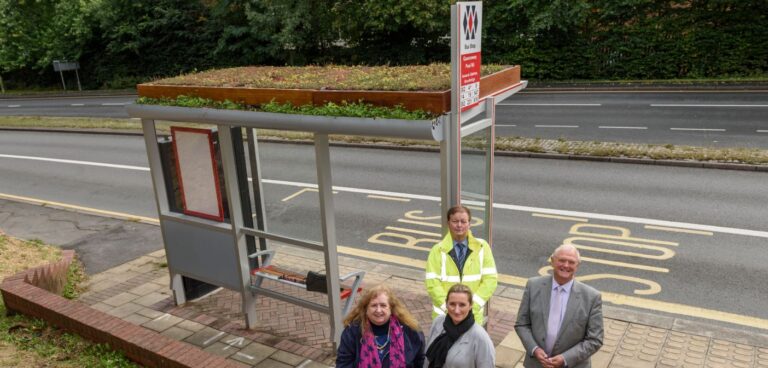Transport for West Midlands (TfWM) has unveiled new bus shelters which aim to improve air quality, can generate their own power and even attract bees.
Trialled in Halesowen, the shelters are made from recycled materials and the roofs include plants designed to reduce carbon in the environment, as well as filters to catch fine particles and improve air quality.
Solar panels will not only generate power for the display screens and lights but also allow people to charge mobile phones for free while waiting for the bus
Cllr Kath Hartley, who chairs TfWM’s transport delivery committee, said: “As we face this climate emergency it is important, we look at new ways of improving our environment
“Not only can it make a difference to the air we breathe but offers real convenience for bus passengers with the offer of free solar-powered phone charging while they wait – a great innovation. I look forward to seeing more of these shelters on our streets in future.”
TfWM, which is part of the West Midlands Combined Authority (WMCA), teamed up with manufacturer Bus Shelters Ltd to develop the new shelters and installed two prototypes in Queensway. It has worked with the Halesowen Business Improvement District (BID) and Halesowen in Bloom to bring some plant-topped bus shelters to improve the town centre environment.
Vicky Rogers of Halesowen BID, added: “This is a fantastic example of innovative urban greening as well as a contribution to biodiversity, climate resilience, carbon absorption and the reduction of airborne pollutants. The mix of wildflowers and Sedum plants will attract pollinating insects, of which we have sadly seen the numbers decline over the years.
“Halesowen BID continues to look at further urban greening projects and creating healthy green spaces or perhaps even walls. We have all recognised the importance of health and wellbeing throughout the pandemic and this is certainly a positive step towards making our town greener.”
If the trial proves successful more of the environmentally friendly stops could be installed as TfWM replaces and renews its 5,000 bus shelters across the region – playing a part in helping the region achieve its 2041 net-zero carbon targets.





